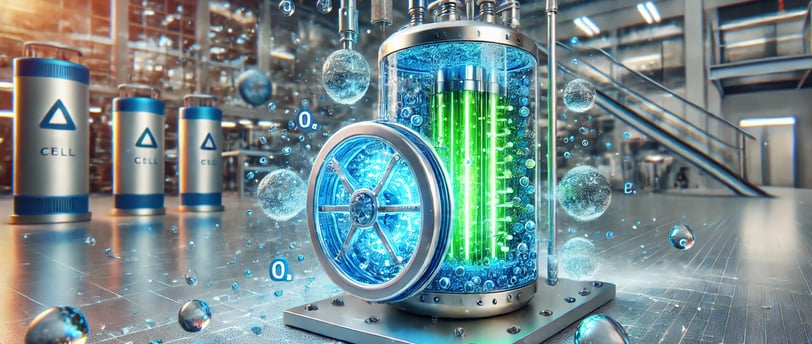Hydrogen Fuel Cells: Powering the Future of Clean Transportation
Discover how hydrogen fuel cells are revolutionizing clean transportation with zero emissions, high efficiency, and fast refueling. Learn about their benefits, challenges, and future potential.
Paola Bennardo
3/8/20253 min read


Imagine a world where your car emits nothing but water vapor, where the air is cleaner, and the hum of engines is replaced by the quiet whir of cutting-edge technology. This isn’t science fiction—it’s the promise of hydrogen fuel cell technology. As the world shifts toward clean energy, hydrogen fuel cells are emerging as a game-changer in the race to power zero-emission vehicles. But what exactly are they, and how do they work? Let’s dive in.
What is a Hydrogen Fuel Cell?
At its core, a hydrogen fuel cell is a device that converts electrochemical energy into electricity. Unlike traditional batteries, which store energy, fuel cells generate it on the go. They combine hydrogen and oxygen to produce electricity, with water and heat as the only byproducts. Sounds simple, right? But the science behind it is nothing short of revolutionary.
How Do Hydrogen Fuel Cells Work?
Think of a hydrogen fuel cell as a sandwich. The “bread” consists of two electrodes: an anode and a cathode. The “filling” is a proton exchange membrane (PEM), a special material that allows protons to pass through but blocks electrons. Here’s how it all comes together:
Hydrogen enters the anode: Hydrogen gas is fed into the anode, where it’s split into protons and electrons.
Protons pass through the PEM: The protons travel through the membrane to the cathode.
Electrons create electricity: The electrons can’t pass through the membrane, so they travel through an external circuit, generating electricity.
Oxygen meets protons and electrons at the cathode: At the cathode, oxygen from the air combines with the protons and electrons to form water.
This process is clean, efficient, and incredibly quiet. No combustion, no pollution—just pure energy.
The Benefits of Hydrogen Fuel Cells
Why all the buzz about hydrogen fuel cells? Here’s why they’re a big deal:
Zero emissions: The only byproduct is water vapor, making them a cornerstone of clean energy.
High efficiency: Hydrogen fuel cells are more efficient than internal combustion engines, converting up to 60% of the energy in hydrogen into electricity.
Versatility: They can power everything from cars to buses, trucks, and even buildings.
Fast refueling: Unlike electric vehicles that take hours to charge, hydrogen fuel cell vehicles can refuel in just a few minutes.
Hydrogen Fuel Cell Vehicles: Are They Available in Australia?
Yes, they are! While still in the early stages, hydrogen fuel cell vehicles are making their way to Australian roads. Companies like Toyota and Hyundai have introduced models like the Toyota Mirai and Hyundai Nexo, which boast impressive ranges and quick refueling times.
But there’s a catch: hydrogen infrastructure is still developing. Australia is investing in green hydrogen production and building refueling stations, but widespread adoption will take time.
How Efficient Are Hydrogen Fuel Cells Compared to Other Energy Sources?
Let’s break it down:
Challenges and Innovations
Hydrogen Production
Most hydrogen today is produced from natural gas, which isn’t exactly green. But green hydrogen production, using renewable energy to split water into hydrogen and oxygen, is on the rise.
Hydrogen Storage and Transportation
Hydrogen is light but bulky, requiring high-pressure tanks or cryogenic temperatures for storage. Innovations in hydrogen storage and transportation are crucial for scaling up.
Fuel Cell Durability and Reliability
Fuel cells need to withstand years of use. Advances in fuel cell catalyst materials, like platinum alternatives, are improving durability and reducing costs.
The Future of Hydrogen Fuel Cells
The potential is enormous. From powering cars to providing backup energy for homes, hydrogen fuel cells are poised to play a key role in the clean energy transition. Governments and companies worldwide are investing heavily in this technology, and the results are starting to show.
Conclusion
Hydrogen fuel cells are more than just a technological marvel—they’re a beacon of hope for a cleaner, greener future. While challenges remain, the progress so far is undeniable. Whether you’re a tech enthusiast, an environmental advocate, or just curious about the future of transportation, hydrogen fuel cells are worth keeping an eye on.
So, what do you think? Are hydrogen fuel cells the future of clean transportation? Share your thoughts in the comments below, and let’s keep the conversation going!
AI ZENTRO
Stay updated with the latest AI innovations today.
AI ZENTRO © 2025. All rights reserved.
